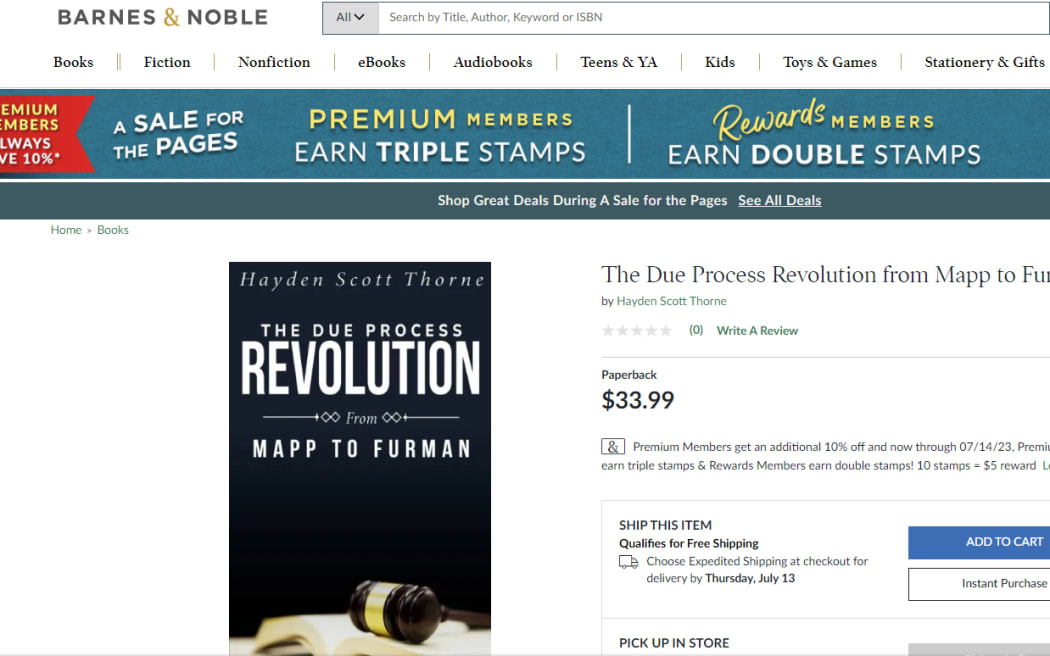
Photo: Supplied
Wellington PhD student Hayden Scott Thorne was idly Googling himself last month when he came across a book he’d apparently written for sale online.
Retailers such as Amazon, US book giant Barnes & Noble, and Australian book site Booktopia were all selling The Due Process Revolution (RRP, $33.99 plus shipping), with his name on it.
Great work, you might think. But Thorne wasn’t so pleased. This book appeared to be his PhD thesis on the US Supreme Court – and he hadn’t given anyone consent to publish it.
“I mean, initially I was really confused like you know, how the heck has this happened,” he told Susie Ferguson.
“You hear stories of dodgy things happening, but you know, Barnes and Noble and Booktopia, they are reputable booksellers. And here's this thing that appears to be my PhD thesis. With my name on the cover.”
It didn’t take long for him to work out that the book was a word-for-word copy of his thesis, including the abstract, with what he assumes is an AI-generated cover “slapped on the front, with my name on it”.
Thorne is still trying to figure out who has published this book and how they did it. So far, his investigations have unearthed about 35 books based on Masters’ and PhD thesis’ from around the world by the same publisher, who he assumes is a fake front using a third party to print on demand.
“That print on demand company have a mechanism to push the listings through to all of the major retailers and from there, it just sits on those retail sites.”
His thesis, like many academic papers, was openly available online.
“It means that people can read your work and hopefully use it and that becomes a little bit more relevant. But I guess, having it freely available, there's also the danger that someone can do something like this to it.”
He’s still fighting to make the book disappear; while the printing company has removed it from their catalogue, this doesn’t automatically remove it from retail sites.
“It's kind of a weird situation. I mean, everyone who I've told the story to has been fascinated by it at the university and elsewhere. I've heard little stories of other things happening. And I wonder if it's something that's kind of a growing area, particularly with things being available open-access. There's always people out there looking to take advantage of things like that.”
Thorne isn’t alone: Last week, five books purportedly by American author Jane Freedman were pulled from Amazon after she complained they were falsely advertised as being written by her. She believes they were written by AI.
Thorne is worried that this book might harm his chances of getting a ‘real’ book published on the same topic.
“My concern is that you approach a publisher with your manuscript and they Google you or Google the title and see that it appears that that's already been published. And so why would they want to be involved? And then you never get a foot in the door.
“I'm still interested in kind of pursuing an academic career and I'm concerned that things like this at some point might reflect badly on my reputation and all my work and how it's presented.”
Sam Irvine, chief executive of Copyright New Zealand, says Thorne’s experience is an example of how AI can be used to generate unlicensed works.
“In the EU, they're currently looking at regulation around AI illegally scraping copyrighted material, images and text and in the US, there's a number of visual artists that have taken AI organisations to court over there."
While New Zealand’s Copyright Act means it’s illegal to copy content and sell it without permission, the same rules don’t apply in other countries, Irvine says.
“There are jurisdictions in the world where they don't respect copyright in the same way that we and most other OECD countries do."
Irvine says New Zealand’s copyright regulations will need to be updated accordingly.
"It's a publicly funded piece of work that Hayden's done. Therefore, it should be available for people to use and, and that's been the case for a long time. However, for someone to then go and take Hayden's work, and publish that and try and make a financial return, that's wrong. That's theft.”

Photo: Screenshot supplied

